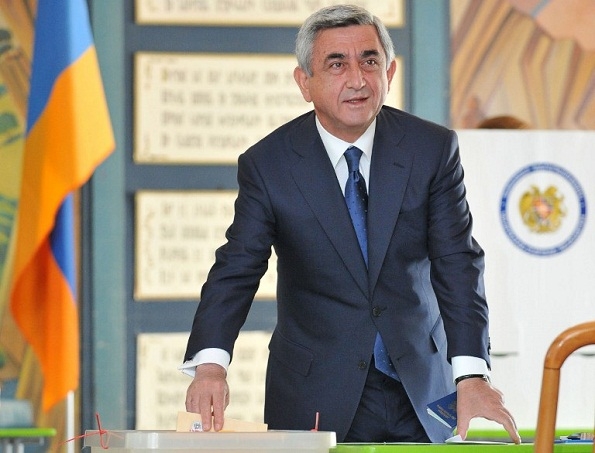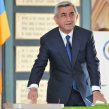
Armenian President Wins Big in Parliamentary Elections
Publication: Eurasia Daily Monitor Volume: 9 Issue: 90
By:

Armenia’s President Serzh Sargsyan has retained control over parliament and received a massive boost to his power as a result of the past weekend’s legislative elections, which his Republican Party (HHK) won by a landslide. Official results of the May 6 vote were a serious setback for his rivals, including the Prosperous Armenia Party (BHK), a junior partner in the outgoing governing coalition widely associated with Sargsyan’s predecessor Robert Kocharian.
Kocharian’s ability to stage a successful political comeback is now in serious question. Sargsyan will be further boosted by the West’s apparent satisfaction with his government’s handling of the elections.
According to the Central Election Commission (CEC), the HHK won almost 44 percent of the votes cast for political parties under the proportional representation system and swept the vast majority of parliament seats distributed in single-member constituencies. This will translate into at least 69 seats in the 131-member National Assembly. The BHK came in second with just over 30 percent of the vote and will have 36 parliament seats. Armenia’s three main opposition groups fared much worse, gaining just enough to clear the legal vote threshold for being represented in the parliament on the party-list basis. The largest of them, the Armenian National Congress (HAK), received 7.1 percent. It was followed by the Armenian Revolutionary Federation (ARF, also known as the Dashnak Party) and the Heritage party, which got roughly 5.7 percent each. A third party represented in Sargsyan’s coalition government, Orinats Yerkir, also won parliamentary seats (5.5 percent) (www.elections.am, May 7).
Predictably, all three opposition contenders refused to recognize the official election outcome as legitimate, saying that it was essentially decided by massive vote buying and multiple voting in the HHK’s favor. According to the opposition parties, this was why there were few reported instances of “traditional” Armenian vote irregularities such as ballot stuffing this time around.
News reports and anecdotal evidence suggest that the payment of vote bribes (commonplace since the early 2000s) was indeed the norm across the country with the average kickback reportedly ranging from 10,000 to 20,000 drams ($25-50) per vote. Armenia’s notoriously inaccurate voter lists proved to be another serious problem. The opposition alleged in the weeks leading up to the elections that the authorities had grossly inflated the number of eligible voters, thus allowing non-existent voters to cast ballots marked for the HHK. These allegations, strongly denied by the authorities, gained more weight on election day when it emerged that ink stamps put on voters’ passports at polling stations (supposedly to prevent multiple voting) routinely faded just minutes after the stamps’ recipients cast their ballots. The CEC blamed that on the poor quality of the ink and/or its incorrect use by precinct election commissions, denying any political reasons for the problem (www.a1plus.am, www.lragir.am, www1in.am, May 6).
The official voter turnout of more than 62 percent reported by the CEC was unusually high for an Armenian parliamentary ballot. Shortly after the closure of the polls, senior representatives of the HAK, the ARF and the governing BHK issued a joint statement at a news conference attended by the author. According to their statement to the media, the high voter turnout figure is “only deepening suspicions regarding the legal course of the elections.” Both the CEC and Sargsyan’s party dismissed these claims, challenging the opposition to come up with documentary evidence of vote buying and multiple voting.
Such evidence has been rather scant, explaining, in part, why the opposition and the radical HAK in particular decided not to hold post-election street protests. The HAK made clear at a May 8 rally in Yerevan, attended by the author, that it will take up its seven parliament seats despite considering the official vote results fraudulent and planning to ask Armenia’s Constitutional Court to annul them. The opposition bloc’s charismatic leader and another former president, Levon Ter-Petrosian, is clearly no longer able to generate the kind of anti-government popular enthusiasm that nearly catapulted him back to power in the last Armenian presidential election in 2008. With the ruling HHK’s less than democratic vote-winning machine now tuned to near perfection, nothing currently suggests that Ter-Petrosian could have another decent shot at the presidency in 2013.
Meanwhile, the BHK, which arguably poses the biggest potential threat to the current Armenian leadership, has still not officially evaluated those results or explained whether it is ready to enter into a new coalition agreement with Sargsyan. Such a deal would most probably commit the BHK to supporting the current president in the next presidential election due in February 2013. Gagik Tsarukian – a wealthy businessman and the leader of the BHK – has so far been reluctant to endorse Sargsyan’s reelection plans amid lingering speculation that Kocharian, widely regarded as the tycoon’s political patron, is plotting a return to power. Kocharian again hinted at his comeback and attacked the government just three days before the elections (Mediamax, May 6). A new HHK-BHK deal would all but preclude the ex-president’s return to the political arena.
Sargsyan can also count on the West’s continued support for his rule. In their preliminary report presented on May 7, nearly 300 Western observers mostly deployed by the Organization for Security and Cooperation in Europe (OSCE) gave a mixed assessment of the Armenian election conduct. While praising relatively equal campaigning opportunities created for all election contenders, the observers reported irregularities, including government loyalists’ “undue interference” in voting, in a “significant number” of polling stations. In contrast to previous OSCE reports on Armenian elections, the observer mission did not say whether the latest vote met democratic standards (www.osce.org/odihr).
Nevertheless, the European Union’s interpretation of the election verdict was quite positive for the Sargsyan government. “We welcome the efforts by the Armenian authorities to hold these parliamentary elections in a way, which represents progress toward more transparent and more competitive elections,” the EU’s foreign policy chief Catherine Ashton and Enlargement Commissioner Stefan Fuele said in joint statement (www.armenialiberty.org, May 8). A spokesman for the US State Department reportedly echoed this assessment (Voice of America, May 8). This was a further indication that Western powers remain generally happy with the Armenian president and unimpressed by any of his political opponents. Whether they think democracy has a better chance of taking root in Armenia under Sargsyan is a different matter.




